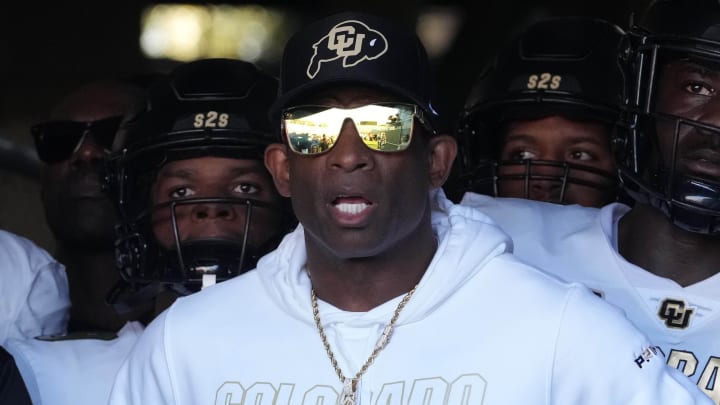Former Colorado coach says he sought NIL funding from Saudi Arabia's PIF in unprecedented move

After resigning as CU’s special teams coordinator on August 1, Trevor Reilly went on the record trying to pull in NIL funding. He expressed to Sports Illustrated that there were no bad feelings between anyone with the program, but rather he was at odds with a few people in Colorado’s administration.
Reilly said he spent time in the Middle East this past holiday season lobbying Saudi Arabia's Public Investment Fund (PIF) for Name, Image, and Likeness (NIL) funding to benefit CU Football. A copy of what Reilly says was in his resignation letter to CU was reviewed by Sports Illustrated.
"The arrangement was that, because I did all the NIL work at Jackson and got us through, you guys would pay me a modest salary and make me the Special Teams Coordinator, which should have freed up time for me to handle NIL activities," Reilly wrote.
"You paid me $90,000 a year and let me handle special teams. … I burned through all my contacts in my Mormon community, which is worth about $3 trillion. Now, I can't get these people to answer my calls because I just found out today that none of my endeavors will happen.
"I even went to Saudi Arabia and got a meeting with the Saudis, who were interested in pursuing
business. I have email receipts to prove it, and you guys let it fall flat on its face."
Reilly said he acted on his own accord trying to pull in donors. “I did nothing illegal and was trying to help Colorado the best way I knew how.” Sports Illustrated reached out to Colorado Athletics who didn't comment on Reilly's trip to the Middle East.
Some of these “outside the box” concepts are small. Earlier this week, 99-year-old CU legend Peggy Coppom received a one-of-a-kind NIL deal for a “I Ain’t Hard 2 Find, Either” Blenders sunglasses sleeve. Some players outside the bigger names secure deals with local businesses. But it's about finding additional funding that will level the playing field for programs like Colorado against powerhouses like Georgia, Alabama, Ohio State, and Texas. This could signal the largest outside the box thinking pertaining to NIL funding that anyone has considered. Regardless of fanbase size, boosters and donors efforts, it’s an untapped resource. A supply that could bury the financial abilities of the stronger programs in the country.
It has seemed that Reilly has been busy looking for ways to compete with the larger NIL deals that would seem unlikely from Colorado. That is until considering an option that is not only outside Colorado, it’s outside the borders of America. Reilly looked into arranging for Colorado to enter into a partnership with the PIF, which is one of the largest sovereign wealth funds in the world. The wealth of riches is near or exceeding one trillion dollars in value. That is a number that levels the playing field immediately and without question or hesitation. CU being funded for NIL through the PIF would render all of those larger programs’ numbers to be inconsequential. If this sounds crazy, it’s really not.
The Saudi government owns multiple international professional soccer clubs outright, along with stakeholder rights in many others, including Chelsea and Newcastle United. They are also the lead backer for LIV Golf, who previously attempted to buy the PGA Tour and partners in ATP, and Formula One.
Funding from a source like this could be the sledgehammer that allows Colorado to break through the glass ceiling that would allow them to compete dollar for dollar with the bigger more consistent programs of the Power four.
Where this gets interesting is how it will be received by the masses. To Reilly’s point, there is nothing illegal, ill-advised, or even frowned upon. When it comes to NIL, the money has to come from somewhere. In this particular case, it just so happens to not come from someone inside of Colorado. Would it be better if CU alums, boosters or other Colorado interests were the ones funding the NIL deals? Yes. The only question is how will this land for the individual fan.
Rich Eisen was one of the people who was not pleased with the PIF buying into the sports world outside of their own national interests.
“This is Saudi Arabia buying the PGA Tour,” Eisen said on his show. “And also buying the lawsuits going between both entities, the LIV golf tour and the PGA Tour, and dropping those lawsuits. That’s what this is about. The Saudi Prince doesn’t want to be deposed. This has been explained to me by multiple people. How it comes across can be expressed in two words. It stinks. It stinks to high heaven, that’s five words…
"Jay Monahan is quoted as saying ‘LIV is using players and the game of golf to sports wash the recent history of Saudi atrocities.’ And today, what Saudi atrocities? Poof. Gone. How does Rory McElroy feel today? Tiger Woods, who turned down almost a billion dollars? I’m just saying, the Saudis own Golf. Period. End of story. That, for the sports world, is an atrocity.”
Some people will say these are the rules of the game (NIL) and Reilly was operating within that scope of rules. Others will look at this from a political standpoint and will resist the idea that this is going to be the new normal. Some might even argue that NIL should come only from an American interest. However, if that is how the model should continue, NIL will never be ‘fair’.
If funding NIL deals can only come from the university, sponsors, boosters and alumni, it will never actually be fair. Similar to other unbalanced dynamics in college football, the big dawgs will continue to win hand over fist, while the other 70 percent of college football will have to make do with table scraps. Good, bad or otherwise, NIL funding through the PIF would completely change that dynamic with the snap of the fingers. Don’t forget, if a university were to secure funding from the Kingdom of Saudi Arabia, it would be an unprecedented move for college athletics.
*This story has been updated to provide clarification of the issues it discusses

